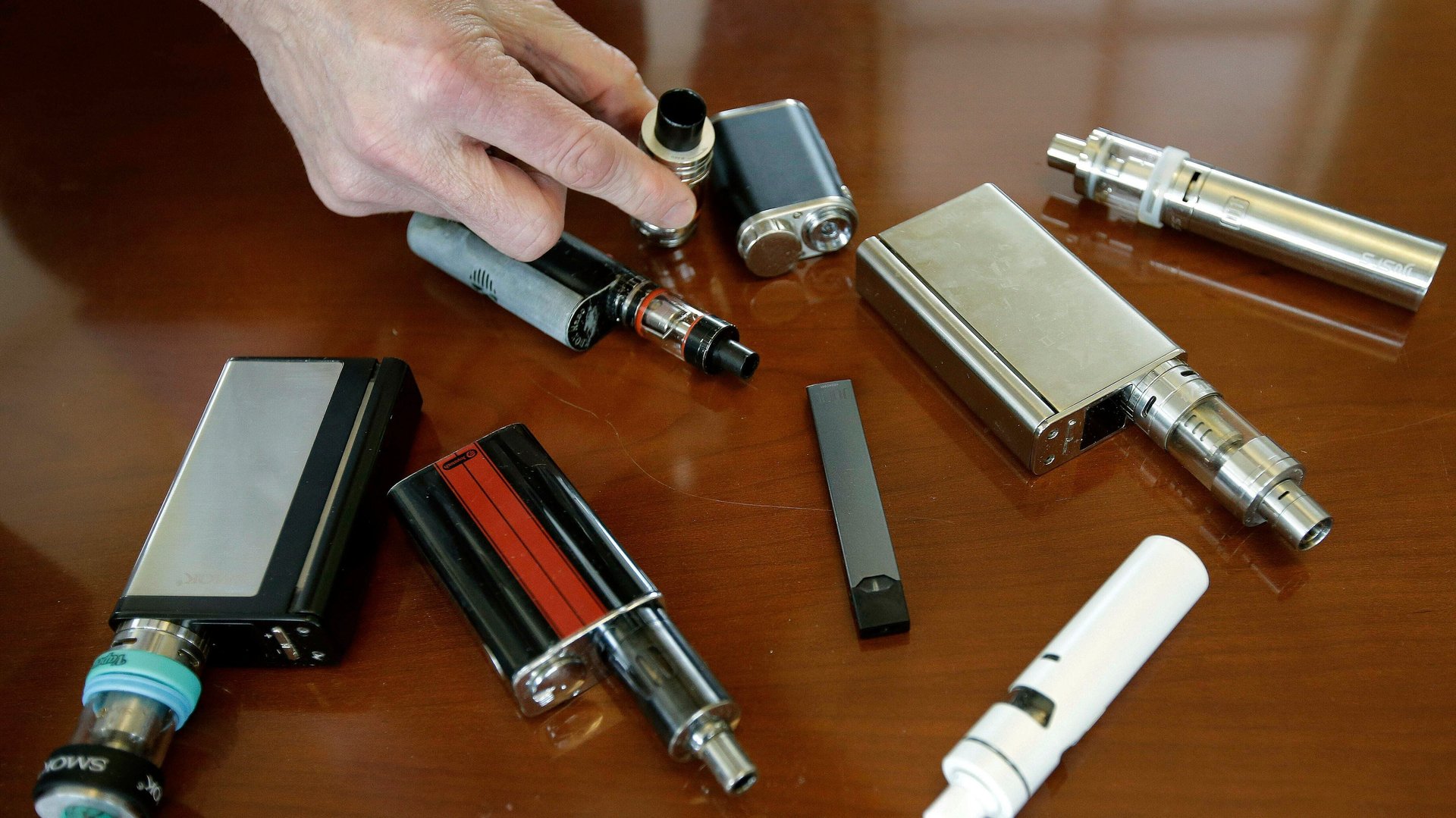A new report asserts that Juul created a “nicotine arms race”
With roughly 70% of the e-cigarette market share, Juul clearly changed the landscape of vaping.


With roughly 70% of the e-cigarette market share, Juul clearly changed the landscape of vaping.
Earlier this week, researchers from Stanford University published a paper (paywall) in the journal Tobacco Control that claims that Juul is responsible for the rise of more addictive, high-nicotine cartridges. The rise of these cartridges, the authors argue, could lead more people to become hooked on e-cigarettes—particularly teens, who hadn’t previously been smokers and really love vaping.
When e-cigarettes hit the US market in 2007, they were viewed as a way for smokers to quit smoking tobacco cigarettes. They contain nicotine, the addictive stimulant in traditional cigarettes, but lacked tobacco—a known carcinogen and the substance that does the most harm to smokers’ health. In 2013, however, Juul patented a new mixture of nicotine salts specifically for its e-cigarette cartridges. It masks the bitter flavor of nicotine, which means that a puff that tastes the same as a lower-octane cartridge recipe can pack a larger punch of nicotine.
Most cartridges Juul introduced contain more than twice as much nicotine than other cartridges—5% of each cartridge by weight, compared to the usual 1% to 2% that were already on the market. (Juul also makes cartridges that are 3% nicotine in mint and Virginia tobacco flavors.) When Juul’s cartridges hit the market in June 2015, the study authors argue, they spurred other cartridge-makers to create products that contained 5% to 6.5% nicotine. Although these products legally can’t be sold to people under 18, several of these cartridges have sweet flavorings that were arguably marketed to teens, who could quickly become addicted. Although it’s not clear how many teens are addicted to nicotine, previous work has suggested (paywall) that smoking a quarter of a pod per day would contain the amount of nicotine needed to become addicted.
Some of the newer knockoffs identified are cheaper than Juul cartridges, too. “The rush to higher and higher nicotine concentration has reduced the cost of nicotine addiction,” Robert Jackler, the lead author of the paper, told CNN. Nicotine doesn’t contain the same health risks as tobacco for users, but its long-term risks in young populations are largely unknown. Early lab work has suggested that other chemicals in vapes may damage lung cells, too.
In an email to Quartz, Victoria Davis, a spokesperson for Juul, pointed out that Juul was not the first company to sell vaping products with higher percentages of nicotine; smaller companies like Vuse and NJOY started selling high-nicotine cartridges as early as 2007.
However, Juul’s massive share of the e-cigarette market gives the company a lot more sway over the market than smaller companies. “Juul is in a position to set the standard for things like this,” Robert Pagano, the head of Vapor Vanity, a website that reviews e-cigarette products, told Quartz in an email. “Other companies that make similar pod-style devices are forced to keep up with Juul, or else they will lose what little share of the market that they have.”
Juul’s Davis told Quartz that the products the Stanford team identified that are labeled as “Juul compatible” are illegal because they do not follow the criteria laid out by the US Food and Drug Administration’s (FDA’s) 2016 rule that mandates that all e-cigarettes contain warning labels and marketing authorizations, and are not sold to minors—similar to other tobacco products. She cited the company’s commitment to keep products for adults, including its plan to stop selling flavored products in retail stores in anticipation of a ban from the FDA. However, when the FDA announced that it would instead move to ban menthol cigarettes and flavored cigars, the New York Times reported that Juul left itself some wiggle room to resume flavored cartridge sales at stores with age-verification processes, and these products are still available online.